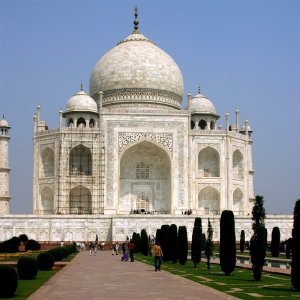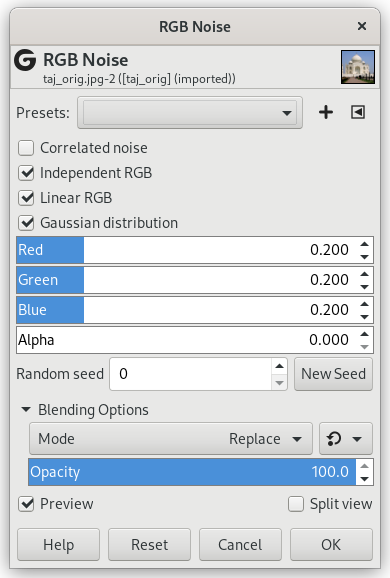The RGB Noise filter adds a normally distributed noise to a layer or a selection. It uses the RGB color model to produce the noise (noise is added to red, green and blue values of each pixel). A normal distribution means, that only slight noise is added to the most pixels in the affected area, while less pixels are affected by more extreme values. (If you apply this filter to an image filled with a solid gray color and then look at its histogram, you will see a classic bell-shaped Gaussian curve.)
Le résultat est un brouillage de l’image. Vous pouvez l’utiliser pour donner un aspect de grain de pellicule photographique ou dans une oeuvre pointilliste.
- Presets, « Input Type », Rognage, Blending Options, Preview, Merge filter, Split view
-
![[Note]](images/note.png)
Note Ces options sont décrites dans Section 2, « Options communes ».
- Bruit associé
-
Noise may be additive (uncorrelated) or multiplicative (correlated - also known as speckle noise). When checked, every channel value is multiplied by a normal distributed value. So the noise depends on the channel values: a greater channel value leads to more noise, while dark colors (small values) tend to remain dark.
- R, V, B indépendants
-
When this radio button is checked, you can move each RGB slider separately. Otherwise, the sliders R, G and B will be replaced by a single slider Value. The same relative noise will then be added to all channels in each pixel, so the hue of pixels does not change much.
- RVB linéaire
-
Opère sur les données de couleur RVB linéarisé.
- Distribution gaussienne
-
Utilise une distribution gaussienne du bruit. Si l’option n’est pas cochée, une distribution linéaire du bruit est utilisée.
- Rouge, Vert, Bleu, Alpha
-
These slidebars and adjacent input boxes allow to set noise level (0.00 - 1.00) in each channel.
La valeur fournie par ces curseurs détermine en fait la déviation standard de la distribution normale du bruit appliqué. La déviation standard utilisée est la moitié de la valeur fixée où 1 est la distance entre les valeurs minimale et maximale d’un canal.
- Graine aléatoire, New Seed
-
This option controls the randomness of the filter. The Random seed box lets you manually enter a seed for the randomization algorithm used. You can also generate a random seed by pressing the button. If the same random seed is used in the same situation, the filter produces exactly the same results. A different random seed produces different results.






